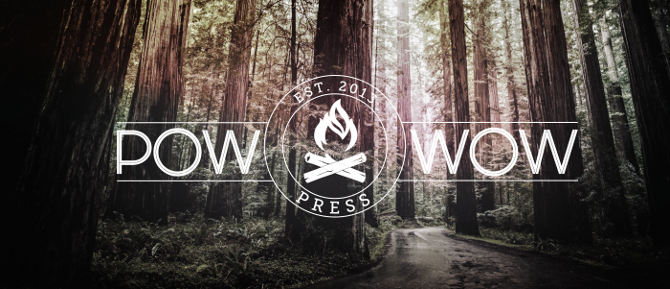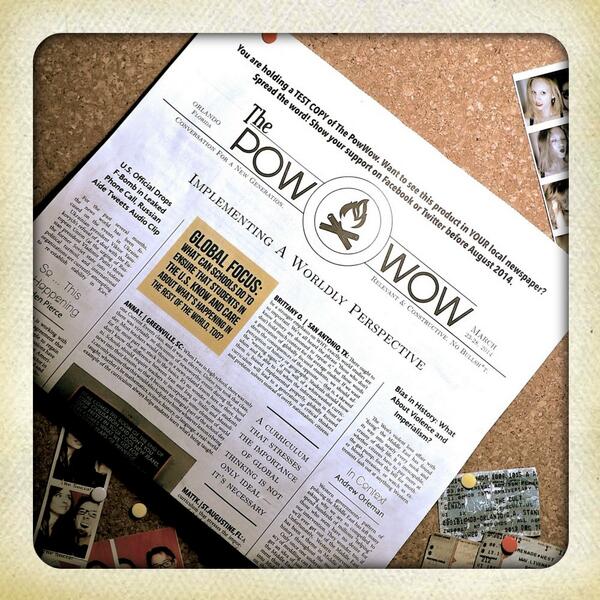If you are a newspaper fan and you fear for their survival, PowWow Press might have a solution to this problem.
PowWow Press team consists of Alison Datko - Managing Editor and Taylor Cleary - Business Development Director.

All information about this startup newspaper syndicate and their Kickstarter campaign you can read in our interview with PowWow Press co-owner Alison Datko.
Q: What is PowWow Press and how it works?
A: PowWow Press is a newspaper syndicate designed to bridge the gap between traditional papers and an evolving readership. We’re hoping to change the way young people look at newsprint by providing more constructive conversation, more accessibility, and less fluff.
We offer a variety of weekly columns, ranging in length from 100 to 650 words. A full list of titles and descriptions are available at PowWow Press. Column subscriptions can be purchased directly through the site.
We also — and perhaps more importantly — offer a product called “The PowWow.” The PowWow is a four-page, fully-designed national newspaper insert that will be syndicated weekly. The insert is designed using a broadsheet layout, distributed digitally (PDF or InDesign) to participating local papers, then printed and inserted among their regular pages.
The PowWow is significant because of its central feature, the “reverse advice” column, in which we ask questions and readers give the answers. We’ll present open-ended questions on social media regarding current political or social events, and readers can respond via Facebook, email or “snail” mail. We’re looking for collaborative, solution-based discussions, so our questions are worded in the vein of “What can American citizens do to increase awareness about ____?” or “Describe a successful charity in your local community, and explain how its methods may be put to use in other communities.” We gather the most constructive answers and print them in The PowWow.

Q: How it all started - idea, website name?
A: Taylor and I met while working as feature editors at a newspaper production company. (We’re responsible for editing the popular syndicated columns printed in most newspaper Lifestyle sections.) Our positions allowed us to view the industry from a unique perspective. We realized that, even though currently syndicated content does not appeal to young readers, large syndicates are unable or unwilling to make dramatic changes for fear of alienating older, loyal readers. But it became clear to us that, if newspapers are to survive, significant changes must take place. Young people simply won’t respond otherwise. So we decided to take the burden of risk upon ourselves. To put it simply, we love newspapers, but we also have nothing — no loyal readers of our own — to lose.
Taylor and I began forming the concept of PowWow in mid-2013, over after-work drinks at a nearby pub. We met multiple times each week, brainstorming, drafting business plans, recruiting freelancers, and discussing the future of the industry and media in general. We called these meetings our “powwows.”
Q: What is your goal?
A: I hope we can revitalize the newspaper industry and provide young adults with a tangible news product that represents them. I also hope to help cultivate truly constructive, valuable discussions among PowWow’s readers.
Q: The way you see media today, both printed and online.
A: Generally speaking, I’m displeased with mainstream media. Most televised new outlets appear simply as echo chambers; many stories are inflated beyond justification, while more important stories are brushed aside.
Regarding online media: I’m happy that online information is so accessible. I’m a fan of bloggers, citizen journalists, and freelancers in all mediums. I do feel, however, that an abundance of online content results in a watered-down, over-saturated viewing experience. I’m tired of scrolling through pages of advertorials, click-bait, and poorly-written or poorly-researched articles just to find something with validity or substance. For every admirable online news outlet, there seem to be thousands of banner-ad-ridden sites vying for our time and attention. The Internet moves so quickly, however, that I don’t anticipate these specific distractions sticking around for long. I think developers are already realizing how much readers are turned off by click-driven content.
I’m a fan of print (obviously), but I understand the financial hardships faced by publishers today. In the newspaper industry, I think the solution lies in merging print and digital effectively — so that each truly supplements the other. That’s what we’re trying to do with The PowWow.
Q: In your opinion does age determine the type of receiving information and why?
A: Yes, it often does. Communicating is such a personal thing, and people will naturally gravitate to whatever method is most comfortable for them. People our age and younger, who are considered digital natives, tend to feel at ease and most informed when receiving information online. Most people who developed strong professional and communication skills without much digital influence, however, seem more comfortable using tangible or face-to-face sources of information.
Q: Tell us about your Kickstarter campaign.
A: We created a Kickstarter campaign to raise startup funds specifically for The PowWow, our newspaper insert. The funds will be used to provide a free, four-week trial of the product for any newspaper editor interested in testing it. This will allow editors to gather reader feedback without any financial risk. We’re asking for donations as low as $1.00 — every penny helps. Our rewards range from social media shout-outs to exclusive editing collaborations via Skype — and include, of course, printed copies of The PowWow.
Q: PowWow Press in the future - your plans, hopes, expectations.
A: We are confident that readers will respond positively to PowWow Press; in fact, we’ve already received interest from many potential readers around the country. We’ve also received industry interest, and will be featured in next month’s print issue of Editor & Publisher.
In the future, we hope to add more freelancers to our list of columnists. We also hope to expand The PowWow with more content as demand increases. Most importantly, we hope to usher in a new, updated era of newsprint.
Q: What do you think about citizen journalism?
A: I’m an avid supporter of citizen journalism. We are all responsible for participating as active, cooperative members of society, and this includes reporting the news and holding each other accountable for our actions.
Q: Your view of citizen journalism future.
A: I think citizen journalism will continue to become more and more prevalent, both in print and online. The Internet has provided us with so much immediate information that we are becoming less likely to wait for answers, and more likely to seek them ourselves. It will remain important to have companies or organizations (such as newspapers, magazines or websites) that bear responsibility for quality and validity, but I expect (and hope) to see an increase in small or independent news outlets over the next few years. I think the loyalty of the general public is likely to switch from large legacy news outlets to a variety of smaller local or niche outlets.